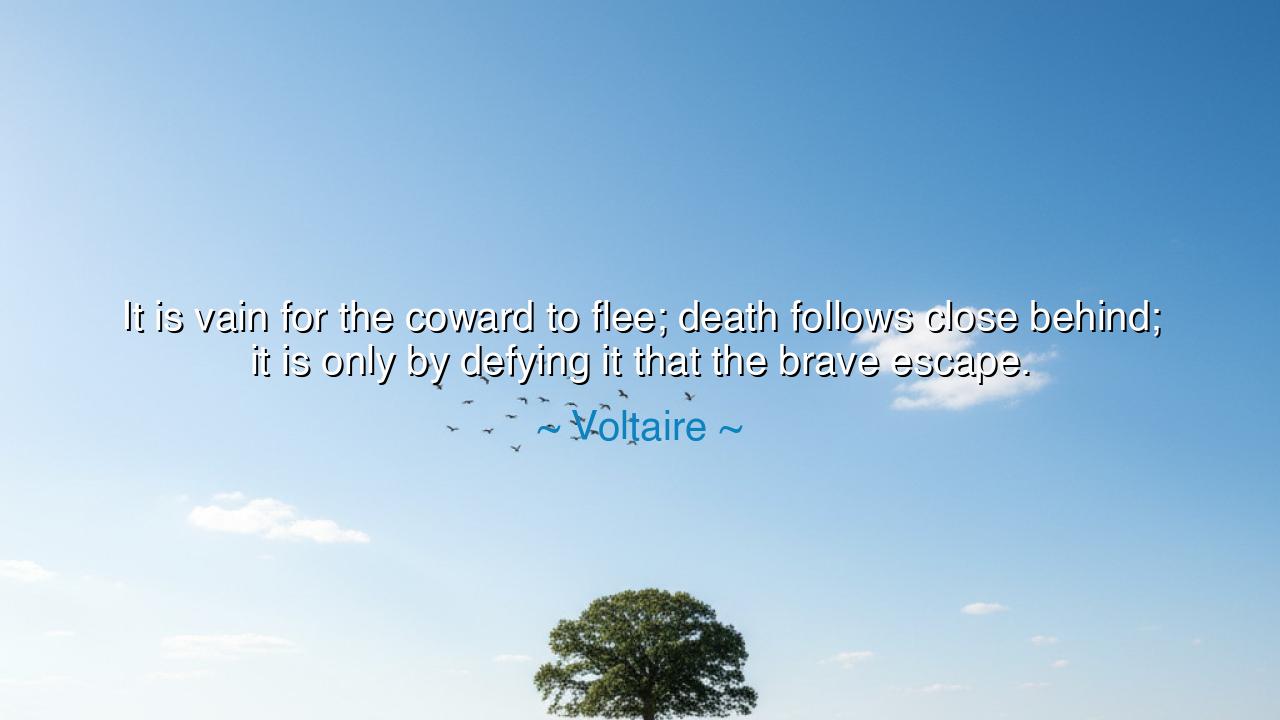
It is vain for the coward to flee; death follows close behind; it
It is vain for the coward to flee; death follows close behind; it is only by defying it that the brave escape.






The words of Voltaire, “It is vain for the coward to flee; death follows close behind; it is only by defying it that the brave escape,” resound like a clarion call from the ancient battlefield of the human soul. In this single line, he captures a truth as old as time itself: that fear does not preserve life, and that only courage allows one to truly live. It is not the body that perishes when a man runs from his fate—it is the spirit. For when one flees from death, one begins to die already; but when one meets it with open eyes and an unshaken heart, one transcends its reach.
Voltaire, the great voice of the Enlightenment, was no stranger to danger or defiance. He lived in an age when ideas could cost a man his freedom or his head, and yet he spoke boldly against tyranny and superstition. His words, sharp as lightning, struck fear into those who wielded power unjustly. When he wrote of cowardice and bravery, he did not speak only of battlefields soaked in blood, but of the invisible wars fought in the mind and conscience of every human being. To flee—whether from truth, from duty, or from death itself—is futile, for fate hunts down the coward wherever he hides. But the brave, by facing their fear, achieve a kind of immortality that no grave can hold.
The ancients understood this paradox well. The Spartans, who stood at Thermopylae against a tide of foes, knew that courage was not the absence of fear, but mastery over it. They faced certain death, and yet in their defiance, they found eternal glory. The coward who fled that day may have survived a few more hours, but his name was lost to history; the brave who stood their ground became immortal in story and song. So too does Voltaire remind us: death is inevitable, but disgrace is a choice. The coward dies a thousand times in shame, while the brave dies once—and lives forever in memory.
And there are other kinds of death beyond the physical—the death of purpose, of love, of integrity. In the world of the spirit, cowardice is surrender, and surrender is decay. Consider the story of Galileo Galilei, who faced the wrath of the Church for declaring that the Earth moves around the Sun. Though he was forced to recant, his mind and his courage defied the darkness of ignorance. He may have been imprisoned, but his truth outlived his oppressors. His quiet defiance was the courage of a man who refused to flee from the light of reason, even when the shadow of death loomed near.
To defy death, then, is not merely to face danger without flinching—it is to live with such intensity, integrity, and purpose that death itself becomes powerless. The brave “escape” not because they elude death’s hand, but because their lives become too vast for it to contain. The coward seeks safety in retreat and finds only despair; the brave seek meaning in struggle and find eternity. Death follows close behind all men, but it bows before the one who walks forward without fear.
This truth is not confined to warriors or martyrs—it belongs to every soul that dares to live authentically. The artist who reveals their truth despite ridicule, the reformer who stands against injustice, the parent who endures hardship for the sake of their child—all defy death in their own way. For to live bravely is to live deeply, and the one who lives deeply cannot be undone by the grave. The coward may live longer, but his days are shallow and haunted by the ghosts of “what could have been.” The brave may die young, but every heartbeat burns with meaning.
Therefore, the lesson, O seeker of wisdom, is this: do not flee from your fear, your pain, or your destiny. Stand firm before them, for they are the fires that forge greatness. When hardship comes, do not ask, “Why me?”—ask instead, “What strength may I awaken through this trial?” To live is to risk, and to risk is to grow. Defy death by living courageously, by speaking truth even when silence is safer, by loving when the world teaches hatred, and by creating when despair says there is nothing left to build.
For in the end, it is not the length of your days that matters, but the flame with which you live them. Death follows close behind, yes—but the brave, by walking into its shadow without trembling, discover the secret that cowards never will: that immortality is not beyond life, but within it.






AAdministratorAdministrator
Welcome, honored guests. Please leave a comment, we will respond soon